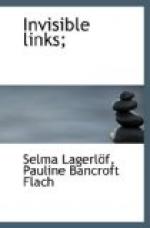Suddenly the hedgehog disappeared, terrified he rolled himself up in his prickles. The crickets crept into the grass, quite silenced. The nightingale sang as if its throat would burst. It was guitars, guitars. The Salvation Army marched forward under the beeches. The people started up from their rest under the trees. The dancing-green and croquet-ground were deserted. The swings and merry-go-rounds had an hour’s rest. Everybody followed to the Salvation Army’s camp. The benches filled, and listeners sat on every hillock. The army had waxed strong and powerful. About many a fair cheek was tied the Salvation Army hat. Many a strong man wore the red shirt. There was peace and order in the crowd. Bad words did not venture to pass the lips. Oaths rumbled harmlessly behind teeth. And Matts Wik, the shoemaker, the terrible blasphemer, stood now as standard-bearer by the platform. He, too, was one of the believers. The red flag caressed his gray head.
The Salvation Army soldiers had not forgotten the old man. They had him to thank for their first victory. They had come to him in his loneliness. They washed his floor and mended his clothes. They did not refuse to associate with him. And at their meetings he was allowed to speak.
Ever since he had broken his silence he was happy. He stood no longer as an enemy of God. There was a raging power in him. He was happy when he could let it out. When souls were shaken by his lion voice, he was happy.
He spoke always of himself. He always told his own story. He described the fate of the misjudged. He spoke of sacrifices of life itself, made without a hope of reward, without acknowledgment. He disguised what he related. He told his secret and yet did not tell it.
He became a poet. He had the power of winning hearts. For his sake crowds gathered in front of the Salvation Army platform. He drew them by the fantastic images which filled his diseased brain. He captivated them with the words of affecting lament, which the oppression of his heart had taught him.
Perhaps his spirit in days of old had visited this world of death and change. Perhaps he had then been a mighty skald, skilful in playing on heartstrings. But for some evil deed he had been condemned to begin again his earthly life, to live by the work of his hands, without the knowledge of the strength of his spirit. But now his grief had broken his spirit’s chains. His soul was a newly released bird. Timid and confused, but still rejoicing in its freedom, it flew onward over the old battlefields.
The wild, ignorant singer, the black thrush, which had grown among starlings, listened diffidently to the words which came to his lips. Where did he get the power to compel the crowd to listen in ecstasy to his speech? Where did he get the power to force proud men down upon their knees, wringing their hands? He trembled before he began to speak. Then a quiet confidence came over him. From the inexhaustible depths of his suffering rose ever torrents of agonized words.




